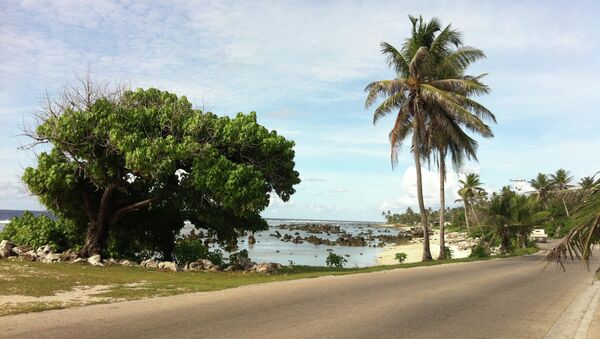MOSCOW, November 2 (RIA Novosti) — Nauru, a tiny island state located north-east of Australia, might seem like a paradise to a tourist. But for some asylum seekers, who dream of settling in a free, peaceful and thriving Australia, found themselves living in a limbo on what Europeans used to call Pleasant Island, might very well consider it hell.
Nauru, with a population of approximately 10,000, is the second smallest state in the world. In 1960s – 1970s it had the highest per-capita income due to revenues from phosphate mining. When the phosphate reserves were exhausted, the local economy crumbled. Nauru tried to develop alternative sources of income, namely through boosting tourism and providing offshore banking services. But the government failed to build a tourist infrastructure and had to fight money laundering. Hence, the once prosperous country is now fully dependent on imports and international aid. Its primary source of financial assistance is Australia. Canberra will provide $33.4 million to Nauru’s almost $100-million budget in 2014 – 2015, according to the New Zealand Herald. Additionally, Nauru receives almost $12 million annually from Canberra as a payment for asylum seekers held at Australia’s Offshore Processing Centre (OPC), opened in Nauru in 2012.
Those asylum seekers, who arrive to Australia by boat primarily from the Middle East without visa, are brought to the Christmas Island and then transferred to offshore processing centers either in Nauru or on the Manus Island in Papua New Guinea. As of September 30, 2014, over 1,160 asylum seekers are held in the Nauru detention center, according to Australian Customs and Border Protection Service.
Amnesty International researchers visited the detention center in 2012. There the team “has found a toxic mix of uncertainty, unlawful detention and inhumane conditions creating an increasingly volatile situation on Nauru, with the Australian Government spectacularly failing in its duty of care to asylum seekers”, the human rights organization said in a press release. “The situation on Nauru is unacceptable. The unlawful and arbitrary detention of these men in such destitute conditions is cruel, inhuman and degrading,” Dr. Graham Thom, Amnesty International’s refugee expert, stated.
Amnesty International tried to visit the island state in early 2014. Nauru’s government turned down their request along with a request from UN human rights observers, citing “the current circumstances and incredibly busy time”, as well as “practical difficulties”, Amnesty International said in a news release. “Nauru’s refusals to allow an independent review of the conditions in the detention centre are another damning development in Australia’s offshore asylum processing system,” said Rupert Abbott, Amnesty International’s Deputy Asia Pacific Director.
Under new regulations, introduced by Kevin Rudd, then prime minister, in July, 2013, asylum seekers, brought to Nauru or the Manus Island, are banned from receiving a refugee status from Canberra and relocating to Australia. If eligible, they can receive refugee status and stay in Papua New Guinea or Nauru. However, leaving these island nations is just as hard as bringing relatives there. Furthermore, refugees are not allowed to share their stories with the outside world.
Despite apparent attempts to prevent human rights activists and journalists from coming to the island, Russian photographer Vlad Sokhin managed to visit Nauru as a tourist. He has recently shared a heart-breaking account of what it is like to live on the islands as a refugee in Russian Reporter magazine.
“Everyone is spying on us here. Every our step is reported to the police. We are strictly forbidden from talking to foreigners or journalists,” Mujtaba, a Shia refugee from Pakistan, told Sokhin. Mujtaba works at Capelle & Partner, the only supermarket on the island, which makes him one of the few lucky refugees to have work. Unemployment in Nauru is as high as 90 percent.
Mujtaba recalled deplorable conditions in the detention center, where he had spent 10 months. Like other asylum seekers, Mujtaba had to share a tent with 20 people. “The tents got unbearably hot in the sun; it was extremely hot inside – no fans, no air conditioning. Children and pregnant women had to live under the same conditions. There were eight toilets for 400 people. We were allowed to use shower for two or three minutes if there was water. Sometimes there was no drinking water,” Mujtaba said. “I think, Australians deliberately forced us to live under such conditions, so that we would spread the word – don’t try to enter Australia illegally, you will go to hell instead.”
Adnan, his wife Mariam and their 12-year-old son fled from Iranian Kurdistan. Adnan’s wife is six months pregnant and in desperate need of medical attention. “My wife is due soon. But she has pregnancy complications,” Adnan told Sokhin. “She suffered from anxiety when we lived in the detention center as if it were prison. The doctor at the Nauru hospital is completely incompetent. Several times my wife was prescribed medication contraindicated in pregnancy. There is no ultrasound scan. We cannot buy vitamins here,” he explained.
These are far from being isolated cases. Vlad Sokhin talked to other people, who were trapped on the small island fleeing persecution in countries like Afghanistan, Iran, Pakistan and Somalia. Following Australia’s agreement with Cambodia, signed last month, they have now an option to settle in the South East Asian nation. But Papua New Guinea, Nauru or Cambodia hardly compare to a developed country and all the opportunities it can provide to people seeking better life. Yet Australia continues to deny them what the UN considers a basic human right.



